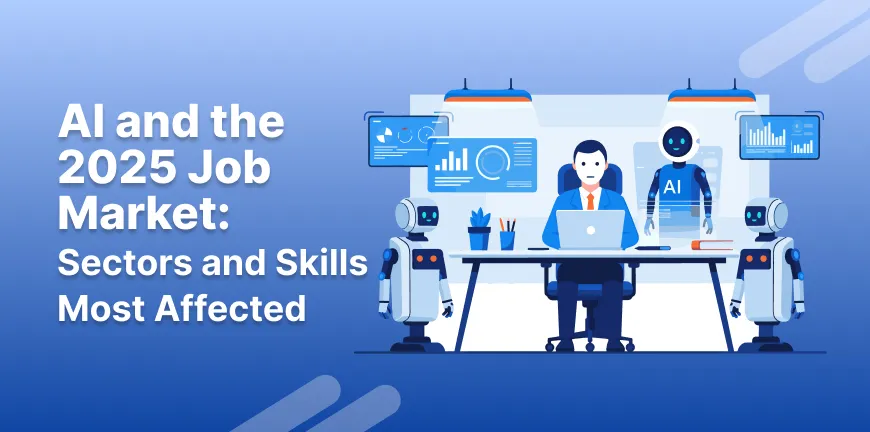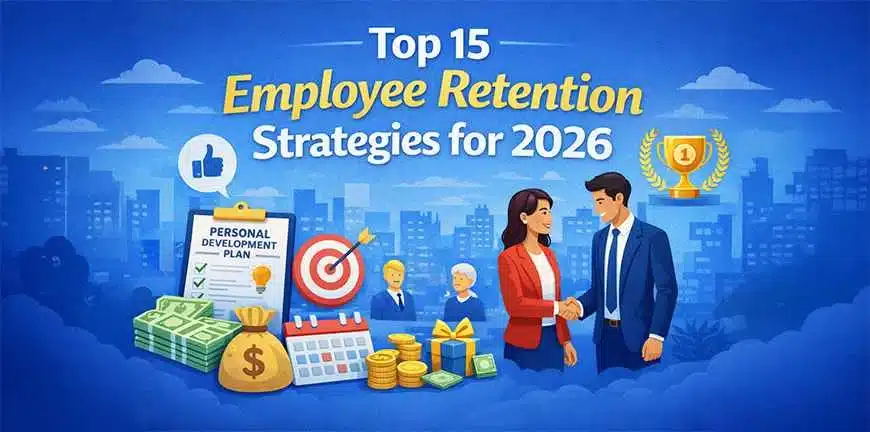
Payroll Migration: A Step-by-Step Guide for a Smooth Transition
25/09/2025
What is HR outsourcing? Meaning & Definition
30/09/2025“AI is the automation of automation, where software writes software. This is the single most powerful force of our time,” says Jensen Huang, CEO, NVIDIA.
In today’s day and age, AI is what we hear about all the time. It is transforming the very fabric of the world landscape. But is it a disruptive technology? The answer is no. We venture into a new world where automation is making the call, and sectors are intensely influenced by this technology. It is not really a hazard if utilized wisely. It is reforming an array of domains in every sector. We must be prepared to learn, adjust, and implement the technology to enhance our work systems.
But what about jobs? Let us have a look at the sectors that are benefiting from the advent of this technology and the areas that are losing out. We also must check out the skills that are gaining momentum in this new era.?
Here is an overview of sectors and skills that are most impacted by AI in 2025:
Sectors
1. Information Technology and Software
In their sector, AI is highly influencing developers as they depend heavily on AI-backed code generation tools, and it is automating various tasks and forms of programming. It is enhancing productivity while diminishing demand for machine coding positions.
2. Finance and Banking
AI is reshaping the finance sector and enabling companies to detect fraud quickly, automating the back office functions and structuring work systems. Professionals in this sector with niche skills are benefiting; however, individuals with traditional skills are no longer in demand to a great extent.
3. Manufacturing and Logistics
Factories today are getting powered up by AI, and the concept of smart factories is gaining momentum. The introduction of robotics and AI-driven tools is making factory operations easier and faster. They manage regular and mundane tasks by automating them, increasing efficiency.
4. Healthcare
An interesting phenomenon has taken over the healthcare sector, where AI and advanced tech are not replacing professionals but accelerating their skills.AI is providing organized work structures, enhancing patient outcomes, and transforming various domains in the sector.
5. Retail & Customer Service
AI-powered tools have penetrated the retail and customer service sectors. Tools like chatbots and other transformative and automated features are making customer service smooth and convenient. Although humans are required to control and monitor but their involvement has been reduced.
6. Education
Learning platforms are also experiencing the AI effect. Traditional educational models cannot keep up with the upgraded advanced tech systems like AI-enabled tutoring, virtual classes. These developments prove to be personalized and helpful for students and learners who now have the flexibility and content designed as per their learning styles and needs.
With adaptive learning platforms and AI tutors, education is shifting toward personalized and self-paced models. Educators must evolve beyond content delivery.
Top Skills Rising in Demand
As we can see that the sectors are evolving with the advent of AI, so are the job functions. Inevitably, skill sets must also be upgraded. Here are some of the significant capabilities in demand:
AI Knowledge- In every sector, professionals must have the ability to comprehend and use AI tools effectively. They must know how to evaluate, oversee, and have the basic tech knowledge to use them.
Data Knowledge- In the AI era, another vital aspect is to interpret, visualize, and assess data accurately. This enables organizations to distinguish between irrelevant and meaningful data.
Logical Thinking and Decision Making- AI automation can analyse large volumes of information and scan critical data, enabling intelligent decision-making. They identify specific patterns and predict customer behaviour.
Constant Learning and Development- The fast-moving AI integration in sectors and systems is creating risk for ordinary skill sets. Professionals must continuously keep learning and upgrading themselves to keep up.
EQ and Transparent Communication – The humans will also play a critical role in this era, as AI cannot emulate human emotions and communication skills that are personal, which are essential to keep the human connection alive. Professionals must learn to foster empathy and develop team-related job profiles.
Human-Oriented AI Governance- There is a high demand for professionals who can utilize AI responsibly. Just as AI can transform processes and enhance efficiency, it also presents risks to ethics. Therefore, the monitoring and control of AI-enabled teams becomes critical.
Skills in Decline
- Manual data entry
- Basic customer support
- Routine bookkeeping
- Low-level coding tasks
- Simple legal/document research
- Standardized report writing
These skills are not completely becoming obsolete, but indirectly are being affected by modern machines.
Key Statistics on AI & the 2025 Job Market
| Value | Source / Context |
| +78 million jobs globally | According to the WEF Future of Jobs Report 2025, anticipating 92 million jobs displaced by 2030, but 170 million new ones created → net +78 million |
| 40% of skills in a job will be different by 2030 | WEF report: driven by technology (including AI), demographic shifts, etc. |
| 63% of employers | In WEF 2025, 63% say skills gap is a primary barrier to business transformation. |
| AI‑skill jobs are growing 3.5× faster than average roles since 2016 | From PwC 2024 Global AI Jobs Barometer. |
| Up to 25‑56% higher wages | PwC reports jobs requiring AI specialist skills carry a wage premium; in 2024, the average is 56% in some markets. |
| 4× increase compared to less exposed sectors | Industries most exposed to AI have seen labour productivity growth of about 27% vs 9% in the least exposed. |
| 42% growth over two years; 14% further growth projected in 2025 | According to Foundit (formerly Monster APAC & ME). |
Human Aspect in the Age of AI
The 2025 job landscape is all about capitalizing on AI to accelerate efficiency in all domains across sectors. The global digital revolution is exciting and beneficial. However, this development has increased the demand for niche professionals who can not only use the advanced technology but also control it to keep the human connection intact.
It is time when professionals do not have to compete with modern tech but collaborate, keep learning new processes. Organizations that understand and adopt new trends will emerge as winners.

Rajkumar Shanmugam
Rajkumar Shanmugam is the Head of HR at ALP Consulting, bringing over 19 years of comprehensive HR leadership experience across India and international markets. His expertise spans talent acquisition, employee relations, performance management, compliance, and HR transformation. Rajkumar has a proven track record of driving people-centric initiatives, enhancing workplace culture, and aligning HR strategy with business goals. With extensive experience in US staffing operations and global mobility, he continues to lead organizational excellence through innovation and employee engagement.




